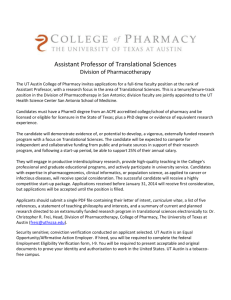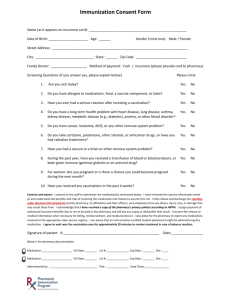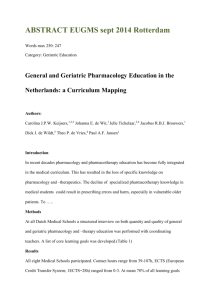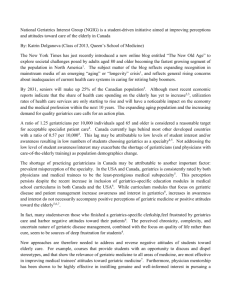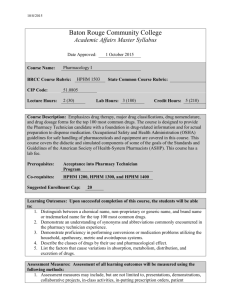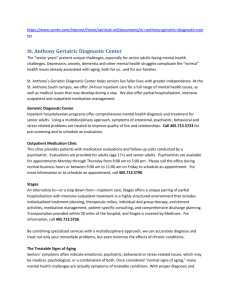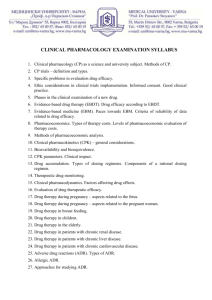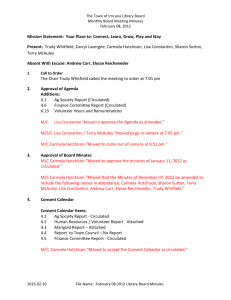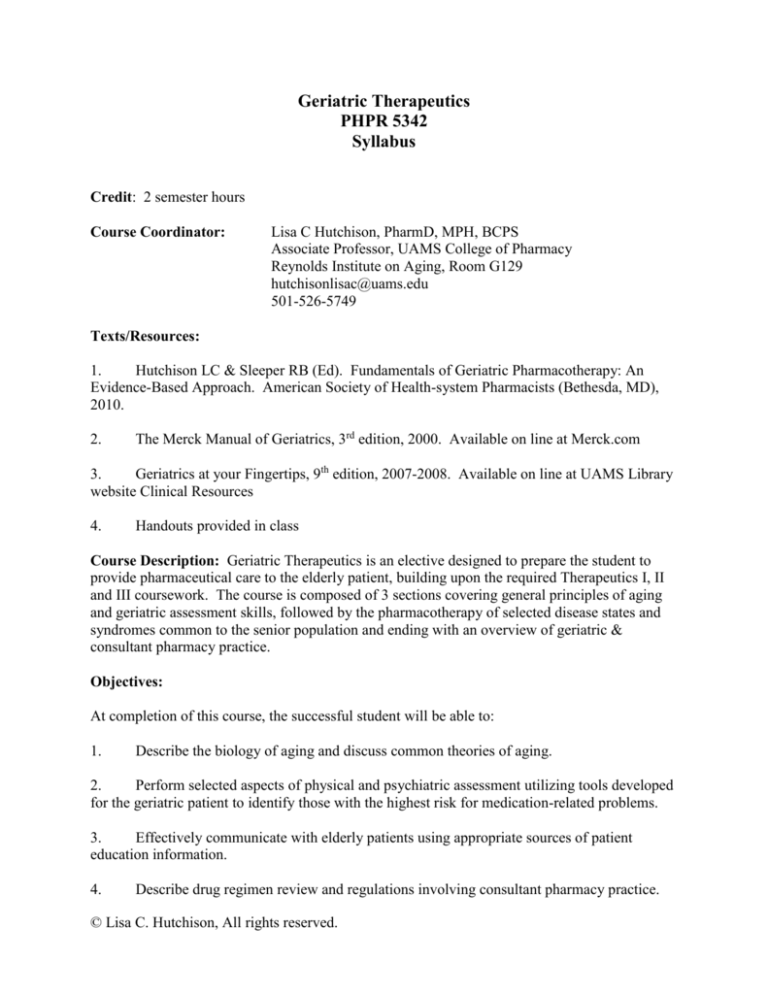
Geriatric Therapeutics
PHPR 5342
Syllabus
Credit: 2 semester hours
Course Coordinator:
Lisa C Hutchison, PharmD, MPH, BCPS
Associate Professor, UAMS College of Pharmacy
Reynolds Institute on Aging, Room G129
hutchisonlisac@uams.edu
501-526-5749
Texts/Resources:
1.
Hutchison LC & Sleeper RB (Ed). Fundamentals of Geriatric Pharmacotherapy: An
Evidence-Based Approach. American Society of Health-system Pharmacists (Bethesda, MD),
2010.
2.
The Merck Manual of Geriatrics, 3rd edition, 2000. Available on line at Merck.com
3.
Geriatrics at your Fingertips, 9th edition, 2007-2008. Available on line at UAMS Library
website Clinical Resources
4.
Handouts provided in class
Course Description: Geriatric Therapeutics is an elective designed to prepare the student to
provide pharmaceutical care to the elderly patient, building upon the required Therapeutics I, II
and III coursework. The course is composed of 3 sections covering general principles of aging
and geriatric assessment skills, followed by the pharmacotherapy of selected disease states and
syndromes common to the senior population and ending with an overview of geriatric &
consultant pharmacy practice.
Objectives:
At completion of this course, the successful student will be able to:
1.
Describe the biology of aging and discuss common theories of aging.
2.
Perform selected aspects of physical and psychiatric assessment utilizing tools developed
for the geriatric patient to identify those with the highest risk for medication-related problems.
3.
Effectively communicate with elderly patients using appropriate sources of patient
education information.
4.
Describe drug regimen review and regulations involving consultant pharmacy practice.
© Lisa C. Hutchison, All rights reserved.
5.
Evaluate therapeutic decisions and preventive care given a patient’s life expectancy and
available evidence for benefit.
6.
Summarize pharmacotherapy for disease states and syndromes common in the elderly
population, including but not limited to pressure sores, constipation, cardiovascular disease,
diabetes, malnutrition, delirium, behavioral and psychological complications of dementia, and
aspects of dying.
Overall Competencies:
Domain 1
1.1 c Conduct physical assessment, and
1.1 d Assess patient quality of life.
1.2 a Identify drug-related problems including adverse drug reactions, drug interactions, and/or suboptimal treatment,
1.2 b Recognize common signs or symptoms indicative of disease control issues or drug-related problems,
1.2 c Ascertain levels of chronic disease control,
1.2 d Assess and address barriers to health care, and
1.2 e Collaborate with the patient or patient advocate to prioritize problems.
1.3 b Select prescription or non-prescription medications (including doses and dosage schedules), applying both pharmaceutical
science and therapeutic principles,
1.3 c Evaluate patient factors that are relevant to selecting pharmacotherapy (e.g., sex, age, race, ethnicity, culture, and
genetics),
1.3 d Define treatment goals and plan to monitor pharmacotherapy for safety and effectiveness,
1.3 e Consider non-drug therapy, therapeutic lifestyle changes, and preventive care issues,
1.3 f Conduct patient education including verification of patient understanding of proper use of medication/device,
1.3 g Implement interventions to prevent or remedy non-adherence, and
1.3 h Implement interventions to resolve drug-related problems and unintended drug consequences.
1.4 a Document assessment and pharmacotherapy plan for individual patient encounters,
1.5 a Communicate with other health care professionals to obtain and share pertinent patient information and pharmacotherapy
recommendations,
1.5 b Perform duties in accordance with legal, ethical, social, economic, and professional guidelines,
1.5 c Maintain professional competence by identifying and analyzing emerging issues, products, and services that may impact
patient care, and
1.5 d Recognize and solve problems using creativity, analysis, and intuition.
Domain 2
2.3 a Establish rapport with patients and other health care professionals to promote a team approach to patient care,
2.3 b Counsel patients regarding purposes of their medications, potential adverse drug reactions, and other required information,
and
2.3 c Provide medication information to patients and health care providers to promote rational drug therapy.
2.4 a Communicate with patients, providers, personnel, and other stakeholders to provide accurate and safe medication
dispensing and resource management,
2.4 b Perform duties in accordance with legal, ethical, social, economic, and professional guidelines,
2.4 c Maintain professional competence by identifying and analyzing emerging issues, products, and services that may impact
medication distribution and the pharmacy business, and
2.4 d Recognize and solve problems using creativity, analysis, and intuition.
© Lisa C. Hutchison, All rights reserved.
Domain 3
3.1 a Participate in disease prevention,
3.1 b Provide lifestyle and wellness counseling,
3.1 c Provide drug-therapy evaluation and monitor for medication safety, and
3.2 a Demonstrate the ability to conduct drug literature evaluations,
3.3 a Collaborate with various stakeholders pertaining to public health issues and pharmaceutical policy,
3.3 b Perform duties in accordance with legal, ethical, social, economic, and professional guidelines,
3.3 c Maintain professional competence by identifying and analyzing emerging issues, products, and services that may improve
disease prevention and wellness and inform pharmaceutical policies, and
3.3 d Recognize and solve problems using creativity, analysis, and intuition.
Student Evaluation:
Students will be evaluated through class participation, written examination and case reports as
follows:
Literature review
Written examination 2 @ 100 points each
Case reports 2 @ 40 points each
Class participation
10 points
200 points
80 points
10 points
Total
300 points
Challenges to the written examinations and case reports may be submitted in writing, with
documentation and must be received no later than 1 week after the return of the examination. All
challenges will be resolved and all grades finalized within 10 working days after the challenge
deadline.
Missed exams or assignments will be accepted, however, total points possible to be earned for
the missed exam or assignment will be reduced by 25% for each day it is late (without a valid
verified excuse).
The College of Pharmacy Academic Dishonesty Policy is in effect for this class.
Letter grades for the course will be assigned based upon the student achieving the following
percentages:
A=
B=
C=
F=
90-100%
80-89%
70-79%
0-69%
© Lisa C. Hutchison, All rights reserved.
Course Content:
Week
Topic(s)
1
Orientation & the Geriatric Medication Game* (2 hours)
2
Biology of Aging (2 hours)
3
Geriatric Assessment (2 hours)
4
Polypharmacy and Inappropriate Medications (1 hour)
Patient/Caregiver Education (1 hour)
5
Nutrition in the Elderly (2 hours)
6
Dietary Supplement Use by the Elderly (1 hour)
Adverse Drug Events (1 hour)
7
Adverse Drug Events-Student Literature Reviews (2 hours)
8
Written Examination (1 hour)
Constipation in the Elderly(1 hour)
9
Behavioral and Psychological Complications of Dementia (1 hour)
Delirium (1 hour)
10
The Aging Skin and Pressure Sores (2 hours)
11
Managing Diabetes and Cardiovascular Disease in the Elderly (2 hours)
12
Death & Dying (1 hour)
Hospice (1 hour)
13
Written Examination (1 hour)
Quality Improvement in Geriatrics (1 hour)
14
Interdisciplinary Teams and Geriatrics (1 hour)
Elder Abuse ( 1 hour)
© Lisa C. Hutchison, All rights reserved.
15
Home and Long-term Care Options & Resources to Prepare for
Consultant Pharmacy Practice (1 hour)
Drug Regimen Review and Consultant Pharmacy Practice (1 hour)
16
Case Report Evaluations (2 hours)
© Lisa C. Hutchison, All rights reserved.



